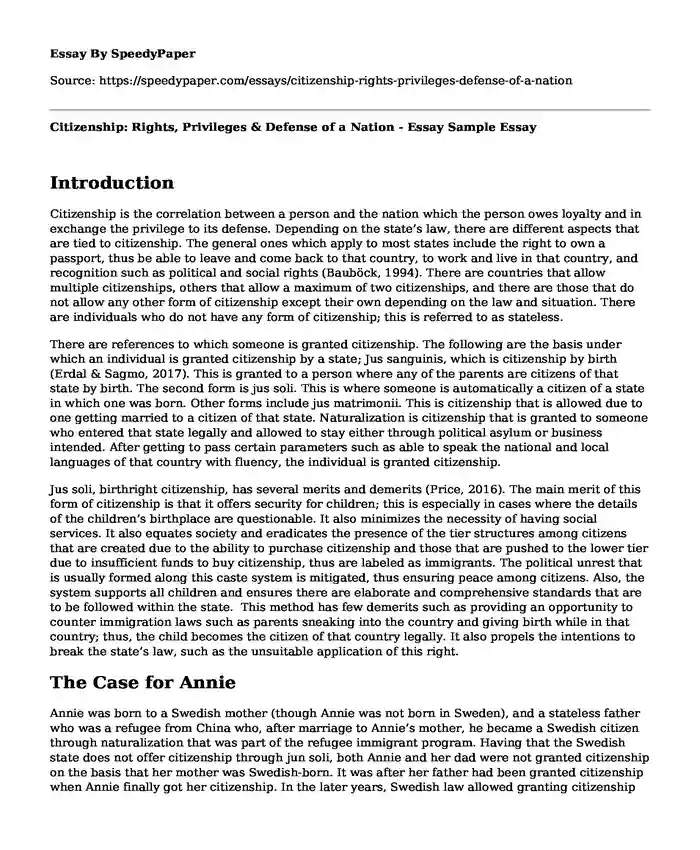
| Type of paper: | Essay |
| Categories: | Human rights Civil rights |
| Pages: | 3 |
| Wordcount: | 754 words |
Introduction
Citizenship is the correlation between a person and the nation which the person owes loyalty and in exchange the privilege to its defense. Depending on the state’s law, there are different aspects that are tied to citizenship. The general ones which apply to most states include the right to own a passport, thus be able to leave and come back to that country, to work and live in that country, and recognition such as political and social rights (Bauböck, 1994). There are countries that allow multiple citizenships, others that allow a maximum of two citizenships, and there are those that do not allow any other form of citizenship except their own depending on the law and situation. There are individuals who do not have any form of citizenship; this is referred to as stateless.
There are references to which someone is granted citizenship. The following are the basis under which an individual is granted citizenship by a state; Jus sanguinis, which is citizenship by birth (Erdal & Sagmo, 2017). This is granted to a person where any of the parents are citizens of that state by birth. The second form is jus soli. This is where someone is automatically a citizen of a state in which one was born. Other forms include jus matrimonii. This is citizenship that is allowed due to one getting married to a citizen of that state. Naturalization is citizenship that is granted to someone who entered that state legally and allowed to stay either through political asylum or business intended. After getting to pass certain parameters such as able to speak the national and local languages of that country with fluency, the individual is granted citizenship.
Jus soli, birthright citizenship, has several merits and demerits (Price, 2016). The main merit of this form of citizenship is that it offers security for children; this is especially in cases where the details of the children’s birthplace are questionable. It also minimizes the necessity of having social services. It also equates society and eradicates the presence of the tier structures among citizens that are created due to the ability to purchase citizenship and those that are pushed to the lower tier due to insufficient funds to buy citizenship, thus are labeled as immigrants. The political unrest that is usually formed along this caste system is mitigated, thus ensuring peace among citizens. Also, the system supports all children and ensures there are elaborate and comprehensive standards that are to be followed within the state. This method has few demerits such as providing an opportunity to counter immigration laws such as parents sneaking into the country and giving birth while in that country; thus, the child becomes the citizen of that country legally. It also propels the intentions to break the state’s law, such as the unsuitable application of this right.
The Case for Annie
Annie was born to a Swedish mother (though Annie was not born in Sweden), and a stateless father who was a refugee from China who, after marriage to Annie’s mother, he became a Swedish citizen through naturalization that was part of the refugee immigrant program. Having that the Swedish state does not offer citizenship through jun soli, both Annie and her dad were not granted citizenship on the basis that her mother was Swedish-born. It was after her father had been granted citizenship when Annie finally got her citizenship. In the later years, Swedish law allowed granting citizenship through the mother.
Annie was born in Hong Kong, where her parents got married. Hong Kong itself is not an independent system; it is complex, and having the right to operate in Hong Kong different from having the right to operate in Britain. However, Hong Kong is closely linked with Chinese, therefore having the Hong Kong passport made Annie be eligible to have a Chinese passport. Annie later became a US citizen; by this time, Sweden had adjusted their policies and allowed dual citizenship.
References
Bauböck, R. (1994). Transnational citizenship: membership and rights in international migration.https://philpapers.org/rec/BAUTCM-4
Erdal, M. B., & Sagmo, T. H. (2017). Descent, birthplace and residence: Aligning principles of citizenship with realities of migrant transnationalism. Norsk Geografisk Tidsskrift-Norwegian Journal of Geography, 71(4), 208-219.
https://www.tandfonline.com/doi/abs/10.1080/00291951.2017.1369456?casa_token=TBxB6DTwS70AAAAA:GIxMWRBadEvrPbKwFRdxLrugXAujK1gm-4JOgIMUL9WwSvT-9D6tyPGSvbDdFATq1xXSzqjmf4m2Enoq
Price, P. J. (2016). Jus soli and statelessness: A comparative perspective from the Americas.https://papers.ssrn.com/sol3/papers.cfm?abstract_id=3150558
Cite this page
Citizenship: Rights, Privileges & Defense of a Nation - Essay Sample. (2023, Nov 29). Retrieved from https://speedypaper.com/essays/citizenship-rights-privileges-defense-of-a-nation
Request Removal
If you are the original author of this essay and no longer wish to have it published on the SpeedyPaper website, please click below to request its removal:
- Essay Example: Current Study on the Effects of the Minimum Wages on Employment
- Why Is the Supreme Court Case of Marbury v. Madison Important? Law Essay Sample
- Free Essay on Marijuana Addiction in Youths
- Free Essay about Nestle: Corporate Governance, Stakeholder Theory, and the Boycott Launch
- Apple-Foxconn Labor Scandal. Free Essay Example
- Free Essay Sample on History of Juneteenth
- Paper Example on Criminal Justice Process: Investigating Crime to Release From Correctional Services
Popular categories




